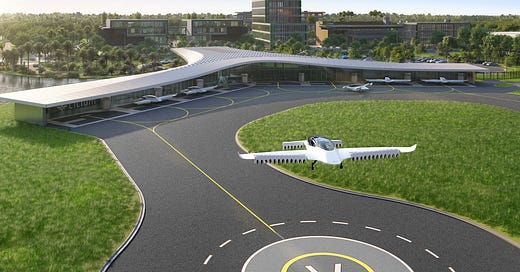Headline Developments
Not the most material headline development to kick off with, but certainly the most exciting!
BMW (BMW.DE) has spread its wings with the successful test of the world’s first electrified Wingsuit. The device was thought up by extreme sportsman Peter Salzmann and has been under three years of R&D with BMW and Designworks. Salzmann reached speeds of 300km/h, three times faster than a traditional wingsuit. The technology leverages insight from BMW’s iEV technology.
As expected, Apple (AAPL) released a new range of computers, powered by its own silicon chips, dubbed the M1. The M1 chips are based on the 5 nanometer (nm) Arm-design which is substantially more advanced than the previous Macbooks, powered by 10nm X86 Intel chips. According to Apple, this gives double the battery life, 2.8x faster processing and 5x faster graphics v the 6-month old Intel-based Macbooks.
Samsung (005930.KS) have released their first 5nm chip, the Exynos 1080 SoC during the week. It is expected the chip will initially be rolled out in Vivo X60 smartphones. Samsung joins Taiwan Semi (TSM) with fab capabilities for the technology.
Donald Trump has banned Americans from investing in companies that are deemed to be “owned or controlled by China’s military” according to the WSJ. In June, the US named 20 such companies including Huawei (002502.SZ), China Railway Construction (1186.HK), China Mobile (941.HK) and China Telecom (728.HK). The prohibition comes into effect on 11th January, and US investment firms have one year to divest any relevant holdings.
Another bad news week for Huawei (002502.SZ). Firstly, Brazil has backed the USA’s Clean Network proposal to build a global digital alliance that excludes technology that Washington sees as “manipulated by China’s Communist government”, according to Reuters. “Brazil supports the principles contained in the Clean Network proposal made by the United States,” said a joint U.S.-Brazil statement.
Secondly, in the northern hemisphere, Swedish courts have forced the telco regulator to halt the 5G spectrum auctions due to its decision to exclude Huawei from the 5G network (which resulted in an appeal from Huawei). The company’s EVP of Central Europe, Kenneth Fredrikson, said “we are willing to cooperate fully in terms of any future requirements they may put as a supplier of 5G equipment”. We view this as purely procedural before regulators simply change those requirements (as is happening this week in the Netherlands).
China’s market regulator has published draft competition rules for online platforms. The rules are aimed to prevent platforms from dominating the market or from adopting methods aimed at blocking fair competition. Companies most likely to be impacted include Alibaba (BABA), Tencent (700.HK), Pinduoduo (PDD), JD.com (JD), Meituan (3690.HK) and Ant Group (private) whose IPO was suspended last week off the back of another set of regulations.
Other Developments
This week we’re reminded of how close a lot of those ‘moonshot’ ideas really are!
Firstly, Virgin Hyperloop (private), backed by Virgin Group and DP World, successfully ‘launched’ its first passenger ride at a test facility in Las Vegas. The test reached speeds of 172km/h, however, the goal is for passengers and cargo to speed through vacuum tubes at close to 1,000 km/h. That would get you from Melbourne to Sydney in less than 45 minutes, or from LA to San Fran in around 30 minutes.
A busy week for Alphabet (GOOG)!
French data centre operator OVH (private) announced their intention to partner with Google to build up its capabilities in cloud computing. This comes after a push from a number of parties in Europe over greater control and autonomy of their data. OVH operates 30 data centres (and 338k servers) worldwide.
Alphabet (GOOG) are using beams of light to delivery internet in Kenya. The technology was first used to transmit data between balloons for Project Loon (which we updated you on last week) but is now a standalone entity called Project Taara. The technology can send data via laser beams without the need for cable or tower infrastructure.
UK defence chief General Nick Carter said he expects robot soldiers could form a large part of the British Army in the 2030s, working in and around humans on the frontlines. In comments to Sky News, General Carter said “I suspect we could have an army of 120,000, of which 30,000 might be robots”.
Boston Dynamics, which Softbank (9984.JP) bought off Alphabet (GOOG) in 2017, is rumoured to be changing hands again, according to a report from Bloomberg. The report claims Hyundai (005380.KS) is running the numbers on a deal which could value the robotics firm at around $1 billion. Boston Dynamics was spun out of MIT before being sold to Google in 2013. As scary as it looks, it’s not hard to see how 30,000 of these robots (below) could be on the frontline at some point in the not too distant future!
In a busy week fo Hyundai, they also announced that all new car models coming off the production line from 2022 will feature the NVIDIA (NVDA) DRIVE platform as standard across its Hyundai, Kia and Genesis brands. The hardware and software stack will provide Hyundai with the foundation for evolving an AI-based connected car operating system (ccOS) based on four core competencies - high-performance computing (i.e. LiDAR, deep learning), seamless computing (i.e. “vehicle to everything (V2X)” technology), intelligent computing (i.e. driver monitoring) and secure computing.
BMW (BMW.DE) announced another EV during the week, an SUV called the BMW iX. The car (below) is expected to have a range of 300 miles (480kms). Some reports indicate a price tag of $70,000. This would put it roughly in line with Tesla Model 3 on price/range. They also announced the release of an electric scooter, the Definition CE 04, and highlighted that they are weighing up options for its mobility services JV with Daimler (DAI.DE), including bringing in new partners or possibly doing a partial sale.
Honda (7267.JP) said they will be the first automaker to mass-produce level 3 autonomous vehicles which, according to Reuters, will allow drivers to let their vehicles navigate congested expressway traffic. “Honda is planning to launch sales of a Honda Legend (luxury sedan) equipped with the newly approved automated driving equipment” before the end of March 2021, Honda said in a press release. With an L3 autonomous vehicle, you can disengage on a motorway but will likely have to re-engage for all/most of the driving in built-up/urban areas.
Tencent (700.HK) backed Lilium (private) announced that they will be launching a flying taxi hub in Orlando. Munich-based Lilium said its vertical-takeoff craft, which is still under development, will travel up to 186 miles (300km) in one hour on a single charge. They can carry four passengers.
Satellite TV provider Dish Network (DISH) is partnering with Qualcomm (QCOM) to build out its 5G network over the next few years. The Dish Open Radio Network Access (RAN) is already partnering with Fujitsu (6702.JP), Nvidia (NVDA), Altiostar (private) and Mavenir (private) to build various other components of the network.
Spotify (SPOT) is rumoured to be launching a subscription podcast service that would offer access to original shows or exclusive episodes for a monthly fee. The potential service was described in a survey sent out through Spotify’s app.
PayPal (PYPL) is opening up its cryptocurrency services to all eligible US users. "We are pleased to announce that all eligible PayPal account holders in the U.S. can now buy, hold and sell cryptocurrency directly with PayPal," the firm said in a statement. The company also announced that they are lifting the weekly crypto purchase limit from $10,000 to $20,000.
M&A | Cap Raise
Take-Two Interactive (TTWO) the game publisher behind Borderlands, Red Dead Redemption and NBA2K, has announced the acquisition of Codemasters (CDM.L), notable for titles such as F1 and Dirt, for close to $1 billion.
Uber’s (UBER) $2.65 billion acquisition of food delivery app Postmates has been approved by the US Justice Department this week. Uber turned their attention to Postmates after their preferred deal, a $6 billion acquisition of GrubHub, was blocked by regulators.
Nuro (private), a self-driving delivery startup, has raised $500 million in a Series C funding. Investors in the round include T Rowe Price (TROW), Fidelity, Baillie Gifford and existing investors Softbank (9984.JP) and Greylock. In February, Nuro received approvals to roll out 5,000 of their R2 vehicles over the next two years. Current partners include Dominos (DPZ), Walmart (WMT), Kroger (KR) and CVS (CVS).
Earnings
Beyond Meat (BYND) shares were off 20% this week after reporting a loss of 28c/share (v 5c profit per share expected)! Strangely they put the loss down to “freezer loading” and “panic buying”, an excuse not highlighted in their prior earnings call. Furthermore, there was a bit of confusion about the company’s collaboration with McDonald’s (MCD). The burger giant announced the “McPlant” would be “crafted exclusively for McDonald’s by McDonald’s” seemingly carving Beyond out, however, Beyond later clarified that it had indeed collaborated with McDonald’s. The nature of the collaboration remains a mystery though.
Softbank (9984.JP) saw their Vision Fund tick back into positive territory during the week. Its investments in 83 companies are worth $76.4 billion v a cost of $75 billion, and they saw a further gain of $1.4 billion booked after undisclosed share sales and exits. So far this year the company has sold $96.5 billion worth of assets, including the pending Arm/Nvidia deal.
Have a great weekend.
Charlie
LinkedIn or E-Mail (cnave@granitebaycap.com)
Granite Bay Capital is an innovation focussed investment company with a deep focus on the companies at the leading edge of innovation across major themes such as AI, ubiquitous computing, sustainability, automation and longevity. Any views expressed in this article are those of the author(s) and do not constitute financial advice.









